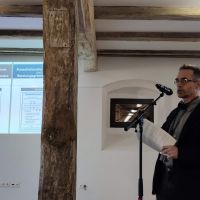CESCI has submitted an application to Central
Policy-making | 04 March 2022
Policy-making | 04 March 2022
Together with several universities, think-tanks as well as local and regional stakeholders representing 8 countries, CESCI submitted a transnational project proposal to the call of the Central Europe Programme at the end of February.
The Interreg Specific Objective of the Central Europe Programme addresses the integrated territorial development of Central Europe through strengthened governance which shall be achieved by the reduction of administrative and legal barriers, better policy-making or participatory decision-making processes in cross-border areas with functional ties.
The main purpose of the so-called CB PAGO project proposal is to strengthen cohesion and to reduce cross-border barriers within the Central European region by enhancing the capacities of public authorities and their cross-border organisations to prepare and implement cross-border integrated strategies and to adapt participatory governance models for developing cross-border interventions. With the involvement of well-known experts at EU level and local sectoral and territorial actors grouped in local support groups, the partners plan to develop a methodological guide whose methods shall be piloted in case study areas with diverse characteristics in terms of their geographical and sectoral specificity and their governance level. Accordingly, the case-study areas include three local level (the twin-cities of Frankfurt-Oder and Słubice, the cross-border metropolitan area of the city of Bratislava and the EGTC GO established by the municipalities of Gorizia, Nova Gorica and Šempeter-Vrtojba) and three regional level (the cross-border integrated emergency care system of Lower Austria and South Moravia, the Euroregion Neisse-Nisa-Nysa and the Ister-Granum EGTC) cooperation structures.
The typical transnational partnership covering 8 programme countries involves expert organisations such as universities (the Brandenburg University of Technology and the Opole University), research institutes and think-tanks (the Institute of International Sociology of Gorizia, the Euro-Institut and CESCI) on the one hand, as well as institutions and authorities from the affected case study areas on the other. In addition, the capitalisation and dissemination of the project outcomes are planned to be performed by European level networks, namely the Association of European Border Regions, the Centre for Expertise on Good Governance of the Council of Europe and the Transfrontier Euro-Institute Network.
In case the proposal successfully meets the selection criteria, the 3-year long project is expected to start at the beginning of the next year.

 Preparations for a joint management organisation of the World Heritage Site...
Preparations for a joint management organisation of the World Heritage Site...